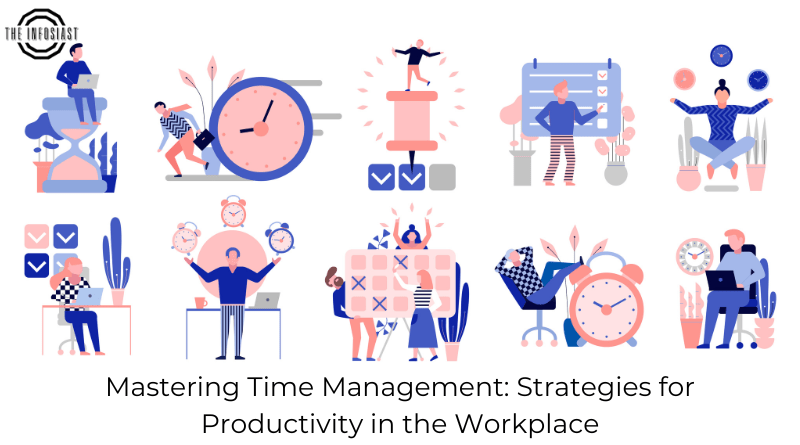
In today’s fast-paced work environment, time management is a critical skill that can make or break your success. Effective time management allows you to stay organized, prioritize tasks, and maximize productivity. In this article, we will explore practical strategies to help you master time management and boost your productivity in the workplace. From setting goals to utilizing technology tools, we’ve got you covered!
Set Clear Goals and Priorities
To effectively manage your time, start by setting clear goals and priorities. Identify what needs to be accomplished and establish realistic deadlines. Break down larger goals into smaller, manageable tasks to avoid feeling overwhelmed. By knowing what you need to achieve, you can stay focused and make better use of your time.
Plan and Organize Your Day
Create a daily or weekly plan to organize your tasks. Prioritize your most important and urgent assignments, and allocate specific time slots for each task. Utilize productivity tools such as to-do lists, calendars, and project management software to keep track of deadlines and stay on top of your responsibilities. This structured approach will help you stay organized and prevent tasks from falling through the cracks.
Avoid Multitasking
Contrary to popular belief, multitasking is not an efficient way to manage your time. Instead, focus on one task at a time and give it your full attention. Multitasking can lead to decreased productivity and errors. By concentrating on one task before moving on to the next, you can complete tasks more efficiently and maintain a higher level of quality.
Delegate and Outsource
Recognize that you don’t have to do everything yourself. Delegate tasks to colleagues or consider outsourcing certain responsibilities if possible. Delegating not only frees up your time but also allows others to develop their skills and contribute to the team’s success. Remember to provide clear instructions and expectations to ensure a smooth delegation process.
Minimize Distractions
Distractions can significantly impact your productivity. Identify common distractions in your work environment and take steps to minimize them. This may include turning off notifications on your phone or computer, finding a quiet space to work, or using time management apps that block access to distracting websites or social media platforms during focused work periods.
Practice Effective Communication
Communication plays a crucial role in time management. Clearly communicate your availability, deadlines, and expectations to your colleagues and stakeholders. When receiving new tasks or requests, ask for clarification on deadlines and priorities to avoid misunderstandings. Effective communication helps streamline processes, reduces unnecessary back-and-forth, and ensures everyone is on the same page.
Take Regular Breaks
While it may seem counterintuitive, taking regular breaks can actually improve your productivity. Schedule short breaks throughout the day to recharge and prevent burnout. Use this time to stretch, walk around, or engage in activities that help clear your mind. Taking breaks allows you to return to your tasks with renewed focus and energy.
Continuously Learn and Improve
Time management is a skill that can always be improved. Stay open to learning new strategies and techniques to enhance your productivity. Attend workshops, read books, or explore online resources on time management. Experiment with different methods and find what works best for you. Remember, what works for one person may not work for another, so be willing to adapt and tailor strategies to your unique needs and work style.
Mastering time management is essential for productivity and success in the workplace. By setting clear goals, planning and organizing your day, avoiding multitasking, delegating tasks, minimizing distractions, practicing effective communication, taking regular breaks, and continuously learning and improving, you can optimize your time and achieve your professional goals. Implement these strategies consistently, and watch your productivity soar. Start taking control of your time today!
Remember, effective time management is a continuous process, so don’t get discouraged if you encounter setbacks along the way. Stay committed, be adaptable, and celebrate your progress as you become a master of time management in the workplace.



